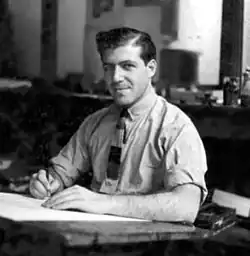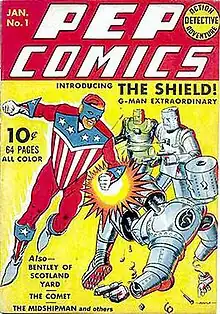Irv Novick
Irving Novick (/ˈnoʊvɪk/; April 11, 1916 – October 15, 2004)[1] was an American comics artist who worked almost continuously from 1939 until the 1990s.
| Irv Novick | |
|---|---|
 Novick at his drawing board | |
| Born | Irving Novick April 11, 1916 Bronx, New York, U.S. |
| Died | October 15, 2004 (aged 88) Dobbs Ferry, New York |
| Nationality | American |
| Area(s) | Penciller |
Notable works | All-American Men of War Batman Detective Comics The Flash G.I. Combat Our Army at War Our Fighting Forces |
| Awards | Inkpot Award 1995 |
Career
A graduate of the National Academy of Design, Irv Novick got his start in the workshop of Harry "A" Chesler. From about 1939 to 1946, Novick was working for MLJ Comics, the company that would later be known as Archie Comics.[2] He became the primary artist for their superhero comics, including the characters the Shield (the first patriotic superhero), Bob Phantom, the Hangman, and Steel Sterling, until MLJ cut back on these titles to focus more on their Archie comics.
He joined the United States Army on April 17, 1943.[3][4]
From 1946 to 1951, Novick worked in advertising and for the largely unsuccessful comic strips Cynthia and The Scarlet Avenger.[5] His long association with DC Comics began when he was hired by editor Robert Kanigher, who had previously written Novick-illustrated comics for MLJ. Novick and Kanigher would be friends and colleagues for many years. Initially, Novick was primarily an artist on war comics such as Our Army at War[6] and occasionally romance comics.[2] Kanigher and Novick introduced the Silent Knight character in The Brave and the Bold #1 (Aug. 1955).[7]
Novick left DC for the Johnstone and Cushing advertising agency in the 1960s, but was unhappy in advertising and was lured back to DC by Kanigher with a freelance contract, a guarantee of steady work and certain perks which was at the time unprecedented.[8] After editorial and management changes in 1968, Novick began drawing superhero titles such as Batman, Superman's Girl Friend, Lois Lane, and The Flash.[2] Novick and writer Frank Robbins crafted the story which revealed the last name of Batman's butler Alfred Pennyworth in Batman #216 (Nov. 1969).[9] The Robbins and Novick team was instrumental in returning Batman to the character's gothic roots, such as in the story "One Bullet Too Many".[10][11] Robbins and Novick created the Ten-Eyed Man in Batman #226 (Nov. 1970)[12] and the Spook in Detective Comics #434 (April 1973).[13] He and Dennis O'Neil launched The Joker series in May 1975.[14] Novick drew the introductions of Duela Dent in Batman Family #6 (July–Aug. 1976)[15] and the Electrocutioner in Batman #331 (Jan. 1981).[16] Novick continued to work, still under contract, until failing eyesight prompted his retirement in the 1990s.[17][18]
Influence
A panel Novick drew in All-American Men of War #89 (Jan.–Feb. 1962) of a U.S. Air Force plane shooting down an enemy plane with the onomatopoeia "WHAAM!" was later appropriated for Roy Lichtenstein's painting of that name.[19][20]
Awards
Irv Novick received an Inkpot Award in 1995.[21]
Bibliography

DC Comics
- Action Comics (Superman) #537–538, 569 (1982–1985)
- Adventure Comics (The Flash) #459–461 (1978–1979)
- All-American Men of War #127–128 (1952)
- All-American Men of War vol. 2 #4–10, 16, 19, 21–23, 25, 33, 35, 40, 45–46, 50, 54, 56, 61, 70, 77, 81–89, 92–111, 115, 117 (1953–1966)
- Batman #204–207, 209–212, 214–217, 219–222, 224–227, 229–231, 234–236, 239–242, 244–250, 252–254, 256–261, 266, 268, 271, 286, 310–311, 313–320, 322–335, 338–339, 341–342 (1968–1981)
- Batman Family (Robin) #6, 8, 12; (Robin and Batgirl) #9 (1976–1977)
- The Brave and the Bold #1–21, 88 (1955–1970)
- Captain Storm #1–11, 14, 17–18 (1964–1967)
- DC Comics Presents #40, 42, 44, 48, 60, 62, 69, 83 (1981–1985)
- DC Special Series (The Flash) #1, 11 (1977–1978)
- Detective Comics (Elongated Man) #364 (1967); (Batman) #414, 418–419, 425, 427, 431, 434–435, 489, 521–522, 595 (1971–1988); (Green Arrow) #523–525 (1983)
- Falling In Love #1 (1955)
- The Flash #200–204, 206–212, 215–263, 265–270 (1970–1979)
- The Flash Special #1 (1990)
- G.I. Combat #48, 50–51, 58, 75, 82, 85, 89–92, 94, 97, 110, 116, 118–120, 122–124, 127 (1957–1967)
- Girls' Love Stories #27 (1954)
- Green Lantern (Green Lantern Corps) #157–158 (1982)
- The Joker #1–2, 5–9 (1975–1976)
- Our Army at War #1–6, 8, 11–13, 15–17, 19, 21–24, 26, 28, 34–35, 40–43, 45, 55, 64, 71, 77, 82, 84, 104, 106, 122, 124, 126, 128, 154, 157, 167 (1952–1966)
- Our Fighting Forces #1–2, 5–6, 8, 12–14, 23, 26, 30–31, 57, 65, 67–68, 73–74, 93–99, 104 (1954–1966)
- Robin Hood Tales #8 (1957)
- Sea Devils #11–12, 14–15 (1963–1964)
- Secret Origins, vol. 2, (Rocket Red) #34; (Teen Titans) Annual #3 (1988–1989)
- Star Spangled War Stories #13, 21, 23–25, 29–30, 35–36, 40–41, 43, 47–48, 51, 63, 65, 67, 71, 90, 98, 101–102, 109, 116, 153 (1953–1970)
- Strange Sports Stories #2, 4–5 (1973–1974)
- Superman #393, 406–407, Special #3 (1984–1985)
- The Superman Family (Mr. and Mrs. Superman) #213–215, 221 (1981–1982)
- Superman's Girl Friend, Lois Lane #82–85, 87–88, 90, 93, 96–103 (1968–1970)
- Teen Titans #8–10, 12, 45–46 (1967–1977)
- Tomahawk #113 (1967)
- Wonder Woman #173–176, 213, 318 (1967–1984)
- World's Finest Comics (Superman and Batman) #281–282; (The Atom) #283 (1982)
References
- Social Security Death Index, SS#112-28-4536.
- Irv Novick at the Grand Comics Database
- "Index Record for Irving Novick WWII Army Enlistment Records", (Army Serial Number 32891681), content source is the United States National Archives and Records Administration accessed from Fold3 by Ancestry.com website. Retrieved April 28, 2021.
- Karlen, Dave. "Comic Art Legend: Irv Novick", Dave Karlen Original Art Blog website, September 25, 2012. Retrieved April 28, 2021.
- Bails, Jerry (n.d.). "Novick, Irv". Who's Who of American Comic Books 1928-1999. Archived from the original on May 11, 2007.
- Pasko, Martin (2008). The DC Vault: A Museum-in-a-Book with Rare Collectibles from the DC Universe. Philadelphia, Pennsylvania: Running Press. p. 72. ISBN 978-0762432578.
It was Bob Kanigher who led the company into the new genre [of war comics]...Kanigher originally worked on these books with many artists, including Jerry Grandenetti, Gene Colan, Russ Heath, and Irv Novick.
- Irvine, Alex; Dolan, Hannah, ed. (2010). "1950s". DC Comics Year By Year A Visual Chronicle. London, United Kingdom: Dorling Kindersley. p. 77. ISBN 978-0-7566-6742-9.
The first issue introduced a number of new characters, most notably the Silent Knight...by writer Robert Kanigher and artist Irv Novick.
{{cite book}}:|first2=has generic name (help)CS1 maint: multiple names: authors list (link) - Evanier, Mark (October 15, 2004). "Irv Novick, R.I.P." NewsFromMe.com. Archived from the original on December 20, 2013.
- Forbeck, Matt; Dougall, Alastair, ed. (2014). "1960s". Batman: A Visual History. London, United Kingdom: Dorling Kindersley. p. 103. ISBN 978-1465424563.
Writer Frank Robbins and artist Irv Novick revealed Alftred's last name as Pennyworth.
{{cite book}}:|first2=has generic name (help)CS1 maint: multiple names: authors list (link) - McAvennie, Michael "1960s" in Dolan, p. 135: "When Dick Grayson moved out of Wayne Manor to begin college, writer Frank Robbins and artist Irv Novick orchestrated a chain reaction of events that forever altered Batman's personality."
- Robbins, Frank (w), Novick, Irv (p), Giordano, Dick (i). "One Bullet Too Many!" Batman, no. 217 (December 1969).
- McAvennie "1970s" in Dolan, p. 141: "Scripter Frank Robbins and artist Irv Novick gave Batman two handfuls of trouble in this issue."
- Manning, Matthew K. "1970s" in Dougall, p. 114: "Scripter Frank Robbins and penciller Irv Novick introduced a new villain, the green-robed Spook, in this comic."
- McAvennie "1970s" in Dolan, p. 163: "It may have been an unusual idea at the time, but writer Denny O'Neil and artist Irv Novick decided to feature a villain in his own comic book."
- Manning "1970s" in Dougall, p. 123
- Manning "1980s" in Dougall, p. 138
- "Irv Novick". Lambiek Comiclopedia. September 4, 2009. Archived from the original on October 2, 2013.
- Cronin, Brian (June 15, 2009). "Month of Art Stars: Artist's Choice – Irv Novick". Comic Book Resources. Archived from the original on September 26, 2009. Retrieved December 19, 2013.
- Daniels, Les (1995). DC Comics : Sixty Years of the World's Favorite Comic Book Heroes. New York, New York: Bulfinch Press. p. 149. ISBN 0821220764.
Of particular interest to Lichtenstein was artist Irv Novick, who had been Lichtenstein's superior officer in an army unit assigned in 1947 to create posters, signs and other artistic ephemera of military life. Fifteen years later, Novick was a journeyman comic book artist on DC titles like All-American Men of War, and the panels he drew were providing fodder for Lichtenstein paintings that would eventually sell for millions of dollars apiece.
- Waldman, Diane (1993). "War Comics, 1962–64". Roy Lichtenstein. New York, New York: Solomon R. Guggenheim Museum. p. 104. ISBN 0-89207-108-7.
He modeled Whaam! on a panel from "Star Jockey"..., making several alterations that might at first seem insignificant but are in fact rather substantial. In the comic-strip panel (fig. 92), the central element is the airplane on the left, which has just scored a major victory over the enemy aircraft. Although it conveys the impact of the explosion, it shows the enemy plane smaller, at a distance, dominated by the huge letters of the exclamation "WHAAM!" whereas in Lichtenstein's version, the conquering plane and the exploding plane are given equal prominence. The painting balances the good guys against the bad guys, and is a far more compelling image as a result.
- "Inkpot Award Winners". Hahn Library Comic Book Awards Almanac. Archived from the original on July 9, 2012. Retrieved September 6, 2016.
Further reading
- Interview, Comic Book Marketplace #77 (April 2000), pp. 46–52. Gemstone Publishing. Reprinted in Alter Ego #82 (December 2008). TwoMorrows Publishing.
External links
- "DC Profiles #59: Irv Novick" at the Grand Comics Database
- Irv Novick at Mike's Amazing World of Comics
- Tales from The Bible at "Professor H's Wayback Machine"